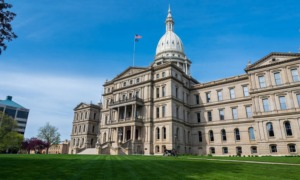DeJuan Bland is community organizer for MOSES (Metropolitan Organizing Strategy Enabling Strength) in Detroit. OST Hub editor Sara Hill asked him a series of questions about his work.
Q: Tell me about how you started in the field.

DeJuan Bland
A: Every summer when I was off from college, I worked with Kendell Barry, at Developing K.I.D.S. It was a six-week summer program. We did academic work, team building, community service. It was my job to create the curriculum for the summer. I graduated college and didn’t want to get a job punching a clock. Two weeks after I graduated, MOSES and the national network Gamaliel held a race and power summit. I found out what community organizing was, and it was the job I wanted but didn’t know existed. One of the nights at the summit they had an “action” that dramatized what was happening at the summit. I offered to write a play about it, a reimagining of “Waiting for Godot,” transposed to America of today, showing the structural and institutional racism, and how it impacts children and youth of color. They gave me the microphone to speak at the end of the play. I got a couple of job offers after that. MOSES, a faith-based community organizing agency in Detroit was one of the offers, and I took it because I wanted to work in the city.
Q: What have you learned that you’d wish you learned from the start of your career as a youth worker?
 A: I’m learning that it’s a co-learning process. I struggle with being pegged as an exceptional person, so whenever I feel like I’m not doing the right thing, it can cause paralysis. What helps is remembering that everything is messy, but without effort, nothing gets done. The second recommendation is to trust in the things I’m good at. There’s a reason that I’m here. It helps me when working with young people, that it’s OK to feel like you don’t have it all together.
A: I’m learning that it’s a co-learning process. I struggle with being pegged as an exceptional person, so whenever I feel like I’m not doing the right thing, it can cause paralysis. What helps is remembering that everything is messy, but without effort, nothing gets done. The second recommendation is to trust in the things I’m good at. There’s a reason that I’m here. It helps me when working with young people, that it’s OK to feel like you don’t have it all together.
Q: What are the biggest changes you’ve seen at your program? In the field?
A: I don’t know if it’s a change, but I’m becoming more aware of an intergenerational divide, and how it needs to be addressed. More seasoned people in the social justice field, they have the experience, and they say, “Just listen to me, and we’ll be all right,” and the young people don’t have space. Conversely, if the youth have the space, they don’t want to hear about the experience and wisdom of more seasoned social justice community leaders. I feel that there needs to be co-creation. The two are siloed, there’s separation and division between people even in one organization.
Q: How have you handled those changes?
A: I have been building relationships across the divide. This is key. The next step is for the leaders, including youth and older people, to build relationships. One thing we did recently is a poetry and politics event. We talk about meaningful things going on in our lives and community, and we use art to drive that conversation. The last couple of sessions have been intentionally intergenerational. That has helped specifically with the campaign that I’m running around juvenile justice reform, which is to stop young people from getting arrested for nonviolent misdemeanors. We were in a space in the campaign where the young people were doing all the work, but their schedule is difficult, they have school, other obligations. Having the older people there to step in the gap when young people can’t be there is helping, and it’s not in a way that they’re taking over the campaign. They’re helping the young generation.
Q: How do you battle burnout, stay resilient?
A: I do a lot of things, music and poetry. I go out and perform [my music and poetry] — that gives me energy. I box, that gives me energy as well. On the job, I ground myself and remind myself about the meaning of the work, why it matters to me.
Q: What are your dreams?
A: I have an end goal. I’m still piecing together what that looks like. I want my writing to be published and studied. I want my life to mean something beyond the time that I’m actually living. I’m a minister, I use everything in my life for ministry. I want to do work that changes how we see the juvenile justice system, not just Detroit and Michigan, but the whole country. There’s a story in the Bible, in the Book of Acts in the New Testament. The disciples are approaching a city, and the officials in the city describe them as the “people who are turning the world upside down.” Along with the people I work with, I want to be described that way, particularly regarding the justice system.
Q: What’s some advice you would give someone entering the field?
A: That this work will have you wrestling with yourself and all the things you didn’t think you had to deal with in yourself. And that’s OK.































